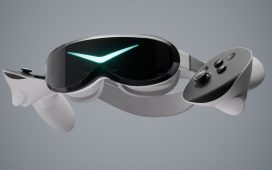
Despite major layoffs from Meta, the company has affirmed that its next-gen consumer headset, Quest 3, is planned for release this year. While it will adopt some of the features from Quest Pro, not all will make the leap.
In November last year, Meta announced plans to reduce its workforce by 13%—a whopping 11,000 cut jobs. And though CEO Mark Zuckerberg said recently in the company’s latest earnings call that 2023 would be focused on streamlining the company, Meta continues to prioritize its VR headset lineup and plans to launch Quest 3 sometime this year.
Meta’s XR division, Reality Labs, is burning more money than ever in its pursuit of beating tech-sector rivals Apple, Google, et all to the metaverse and XR. And even though the company is slashing some XR projects, it’s still full-steam ahead with its consumer headset, says Zuckerberg.
“Later this year, we’re going to launch our next generation consumer headset, which will feature Meta Reality, [like Quest Pro], and I expect that this is going to establish this technology as the baseline for all headsets going forward, and eventually of course for AR glasses as well,” Zuckerberg told investors.
“Meta Reality,” as the company calls it, is Meta’s color passthrough AR solution which was first included with Quest Pron—meaning Quest 3 will include similar color passthrough AR capabilities.
While Quest 3 is likely to adopt the passthrough AR system of Quest Pro, it sounds like it won’t get the eye and face-tracking features of that headset. Meta CTO Andrew “Boz” Bosworth said as much during a Q&A session on Instagram last week.
Replying to a question about when face-tracking would come to consumer-priced headsets, Boz noted, “it’s gonna be a little while… it’s gonna be years. The reason is simple: all those extra cameras and the compute power required to actually do the face-geometry and recognition has a lot of tradeoffs with it, and one of the main tradeoffs is cost.”
This lines up with leaks from last year that also pointed to a Quest 3 with color passthrough AR and no face-tracking; however the lauded ‘pancake’ lenses from Quest Pro may flip to the consumer side.
While the Quest headset line continues, not all of Meta’s hardware projects have been spared the axe. Last year Meta discontinued its Portal video-calling smart speakers, and reportedly cancelled two unreleased smartwatch projects, according to The Verge. That Meta is charging ahead with more headsets shows the company’s priorities remain focused on immersive devices.
Along with those cancellations, Zuckerberg during the earnings call told investors that he was marking 2023 as the “year of efficiency”; an effort to streamline the hulking company to be more nimble and get more done.
“We closed last year with some difficult layoffs and restructuring some teams. When we did this, I said clearly that this was the beginning of our focus on efficiency and not the end. Since then, we’ve taken some additional steps like working with our infrastructure team on how to deliver our roadmap while spending less on capex. Next, we’re working on flattening our org structure and removing some layers of middle management to make decisions faster, as well as deploying AI tools to help our engineers be more productive. As part of this, we’re going to be more proactive about cutting projects that aren’t performing or may no longer be as crucial, but my main focus is on increasing the efficiency of how we execute our top priorities.”











